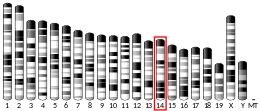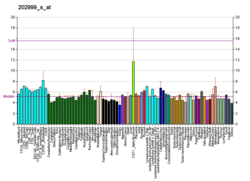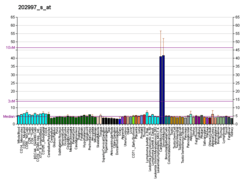LOXL2
Lysyl oxidase homolog 2 is an enzyme that in humans is encoded by the LOXL2 gene.[5][6]
Function
This gene encodes a member of the lysyl oxidase gene family. The prototypic member of the family is essential to the biogenesis of connective tissue, encoding an extracellular copper-dependent amine oxidase that catalyses the first step in the formation of crosslinks in collagens and elastin. A highly conserved amino acid sequence at the C-terminus end appears to be sufficient for amine oxidase activity, suggesting that each family member may retain this function. The N-terminus is poorly conserved and may impart additional roles in developmental regulation, senescence, tumor suppression, cell growth control, and chemotaxis to each member of the family.[6]
LOXL2 can also crosslink collagen type IV and hence influence the sprouting of new blood vessels.[7]
Clinical significance
LOXL2 is an enzyme that is up-regulated in several types of cancer and is associated with a poorer prognosis.[8][9] LOXL2 changes the structure of histones (proteins that are attached to DNA)[10] and thus changes the shape of the cells, making it easier for the cancer cells to metastasize.[11]
An antibody that inhibits the activity of LOXL2, simtuzumab and is currently in clinical trials for the treatment of several types of cancer and fibrotic diseases such as liver fibrosis.[12]
External links
References
- GRCh38: Ensembl release 89: ENSG00000134013 - Ensembl, May 2017
- GRCm38: Ensembl release 89: ENSMUSG00000034205 - Ensembl, May 2017
- "Human PubMed Reference:". National Center for Biotechnology Information, U.S. National Library of Medicine.
- "Mouse PubMed Reference:". National Center for Biotechnology Information, U.S. National Library of Medicine.
- Jourdan-Le Saux C, Le Saux O, Donlon T, Boyd CD, Csiszar K (July 1998). "The human lysyl oxidase-related gene (LOXL2) maps between markers D8S280 and D8S278 on chromosome 8p21.2-p21.3". Genomics. 51 (2): 305–7. doi:10.1006/geno.1998.5356. PMID 9722957.
- "Entrez Gene: LOXL2 lysyl oxidase-like 2".
- Bignon M, Pichol-Thievend C, Hardouin J, Malbouyres M, Bréchot N, Nasciutti L, Barret A, Teillon J, Guillon E, Etienne E, Caron M, Joubert-Caron R, Monnot C, Ruggiero F, Muller L, Germain S (2011). "Lysyl oxidase-like protein-2 regulates sprouting angiogenesis and type IV collagen assembly in the endothelial basement membrane". Blood. 118 (14): 3979–89. doi:10.1182/blood-2010-10-313296. PMID 21835952.
- Nishioka T, Eustace A, West C (2012). "Lysyl oxidase: from basic science to future cancer treatment". Cell Struct. Funct. 37 (1): 75–80. doi:10.1247/csf.11015. PMID 22453058.
- Cano A, Santamaría PG, Moreno-Bueno G (2012). "LOXL2 in epithelial cell plasticity and tumor progression". Future Oncol. 8 (9): 1095–108. doi:10.2217/fon.12.105. PMID 23030485.
- Herranz N, Dave N, Millanes-Romero A, Morey L, Díaz VM, Lórenz-Fonfría V, Gutierrez-Gallego R, Jerónimo C, Di Croce L, García de Herreros A, Peiró S (2012). "Lysyl oxidase-like 2 deaminates lysine 4 in histone H3". Molecular Cell. 46 (3): 369–376. doi:10.1016/j.molcel.2012.03.002. PMID 22483618.
- Moreno-Bueno G, Salvador F, Martín A, Floristán A, Cuevas EP, Santos V, Montes A, Morales S, Castilla MA, Rojo-Sebastián A, Martínez A, Hardisson D, Csiszar K, Portillo F, Peinado H, Palacios J, Cano A (2011). "Lysyl oxidase-like 2 (LOXL2), a new regulator of cell polarity required for metastatic dissemination of basal-like breast carcinomas". EMBO Mol Med. 3 (9): 528–544. doi:10.1002/emmm.201100156. PMC 3377095. PMID 21732535.
- "Search of: simtuzumab - List Results". ClinicalTrials.gov. Retrieved 25 February 2015.
Further reading
- Csiszar K (2001). Lysyl oxidases: a novel multifunctional amine oxidase family. Progress in Nucleic Acid Research and Molecular Biology. 70. pp. 1–32. doi:10.1016/S0079-6603(01)70012-8. ISBN 978-0-12-540070-1. PMID 11642359.
- Molnar J, Fong KS, He QP, Hayashi K, Kim Y, Fong SF, Fogelgren B, Szauter KM, Mink M, Csiszar K (April 2003). "Structural and functional diversity of lysyl oxidase and the LOX-like proteins". Biochimica et Biophysica Acta (BBA) - Proteins and Proteomics. 1647 (1–2): 220–4. doi:10.1016/s1570-9639(03)00053-0. PMID 12686136.
- Maruyama K, Sugano S (January 1994). "Oligo-capping: a simple method to replace the cap structure of eukaryotic mRNAs with oligoribonucleotides". Gene. 138 (1–2): 171–4. doi:10.1016/0378-1119(94)90802-8. PMID 8125298.
- Saito H, Papaconstantinou J, Sato H, Goldstein S (March 1997). "Regulation of a novel gene encoding a lysyl oxidase-related protein in cellular adhesion and senescence". The Journal of Biological Chemistry. 272 (13): 8157–60. doi:10.1074/jbc.272.13.8157. PMID 9079631.
- Suzuki Y, Yoshitomo-Nakagawa K, Maruyama K, Suyama A, Sugano S (October 1997). "Construction and characterization of a full length-enriched and a 5'-end-enriched cDNA library". Gene. 200 (1–2): 149–56. doi:10.1016/S0378-1119(97)00411-3. PMID 9373149.
- Jourdan-Le Saux C, Tronecker H, Bogic L, Bryant-Greenwood GD, Boyd CD, Csiszar K (April 1999). "The LOXL2 gene encodes a new lysyl oxidase-like protein and is expressed at high levels in reproductive tissues". The Journal of Biological Chemistry. 274 (18): 12939–44. doi:10.1074/jbc.274.18.12939. PMID 10212285.
- Hein S, Yamamoto SY, Okazaki K, Jourdan-LeSaux C, Csiszar K, Bryant-Greenwood GD (January 2001). "Lysyl oxidases: expression in the fetal membranes and placenta". Placenta. 22 (1): 49–57. doi:10.1053/plac.2000.0580. PMID 11162352.
- Akiri G, Sabo E, Dafni H, Vadasz Z, Kartvelishvily Y, Gan N, Kessler O, Cohen T, Resnick M, Neeman M, Neufeld G (April 2003). "Lysyl oxidase-related protein-1 promotes tumor fibrosis and tumor progression in vivo". Cancer Research. 63 (7): 1657–66. PMID 12670920.
- Rost T, Pyritz V, Rathcke IO, Görögh T, Dünne AA, Werner JA (2003). "Reduction of LOX- and LOXL2-mRNA expression in head and neck squamous cell carcinomas". Anticancer Research. 23 (2B): 1565–73. PMID 12820424.
- Vadasz Z, Kessler O, Akiri G, Gengrinovitch S, Kagan HM, Baruch Y, Izhak OB, Neufeld G (September 2005). "Abnormal deposition of collagen around hepatocytes in Wilson's disease is associated with hepatocyte specific expression of lysyl oxidase and lysyl oxidase like protein-2". Journal of Hepatology. 43 (3): 499–507. doi:10.1016/j.jhep.2005.02.052. PMID 16023247.
- Peinado H, Del Carmen Iglesias-de la Cruz M, Olmeda D, Csiszar K, Fong KS, Vega S, Nieto MA, Cano A, Portillo F (October 2005). "A molecular role for lysyl oxidase-like 2 enzyme in snail regulation and tumor progression". The EMBO Journal. 24 (19): 3446–58. doi:10.1038/sj.emboj.7600781. PMC 1276164. PMID 16096638.
- Akagawa H, Narita A, Yamada H, Tajima A, Krischek B, Kasuya H, Hori T, Kubota M, Saeki N, Hata A, Mizutani T, Inoue I (May 2007). "Systematic screening of lysyl oxidase-like (LOXL) family genes demonstrates that LOXL2 is a susceptibility gene to intracranial aneurysms". Human Genetics. 121 (3–4): 377–87. doi:10.1007/s00439-007-0333-3. PMID 17287949.






